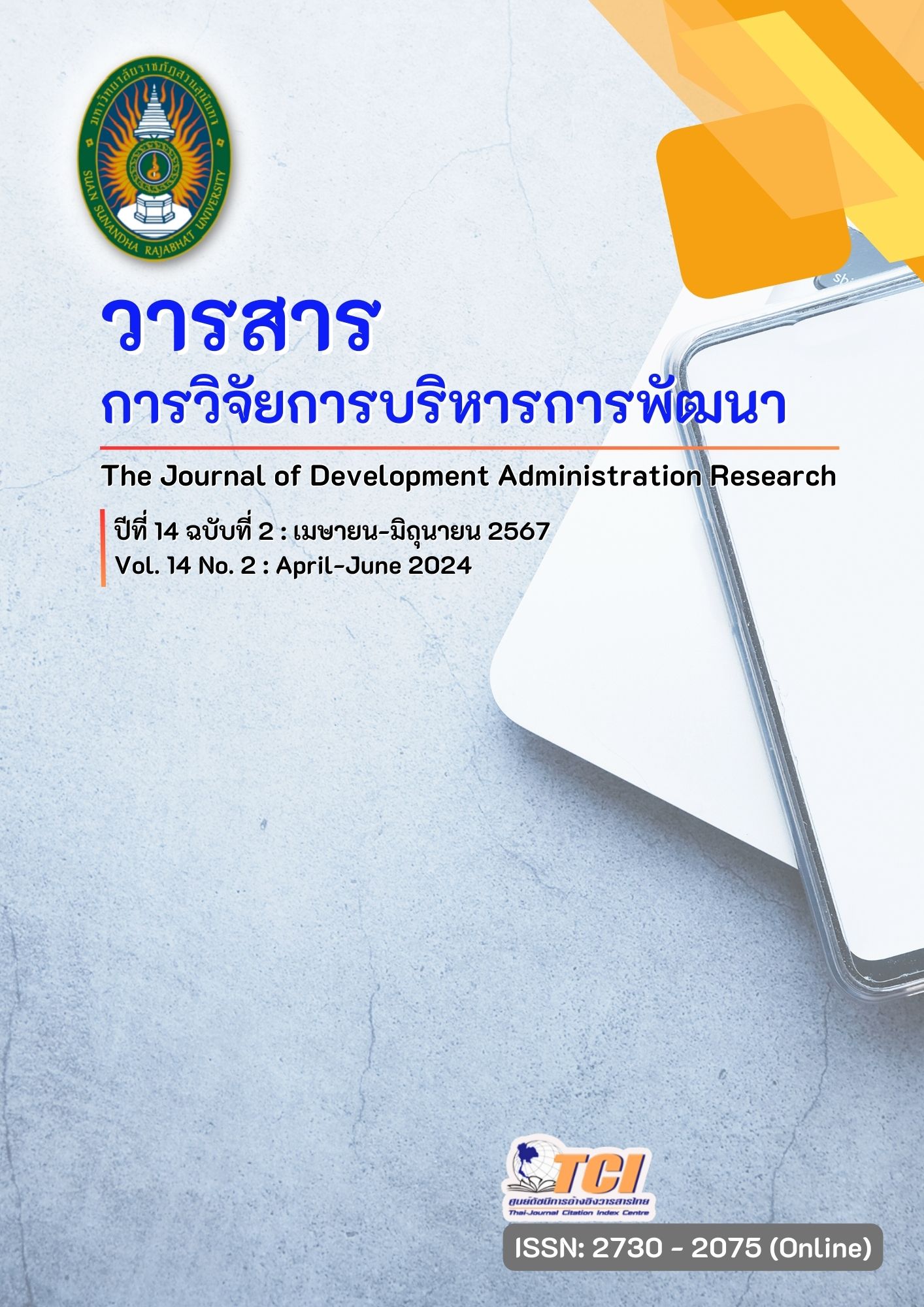Factors Influencing Innovative Work Behaviour in University in Yunnan, China
คำสำคัญ:
Digital Leadership, Digital Culture, Innovation Willingness, Human Capital Enhancementบทคัดย่อ
This study aims to determine the relationship and effects between digital leadership, digital culture, innovation willingness on innovative work behavior of universities in China.This research is quantitative research. Population and sample for the study is college teachers and scholars of universities in Yunnan Province, this study uses the combination of stratified sampling and random sampling to sample universities with different rankings in different Yunnan Province.
The study showed a lowly significant positive relationship between innovation willingness and innovative work behavior. We found that innovation work behavior had moderately significant positive relationships with digital leadership and digital culture. In this study, the results of the multiple regression analysis conducted using the backward method. As these results indicate, our analysis determined that 64.4% of the changes in the innovation work behavior were explained by the changes in the four dimensions. According to these results, the value innovation work behavior can be formulated as follows: “Innovation Work Behavior = 5.960 + (0.756 x digital leadership) + (0.129 x digital culture) + (0.062 x innovation willingness developed)”
เอกสารอ้างอิง
Azeem, M., Ahmed, M., Haider, S., & Sajjad, M. (2021, August 1). Expanding Competitive Advantage Through Organizational Culture, Knowledge Sharing and Organizational Innovation. Technology in Society, 1-10.
Baba, M. M., Makhdoomi, U. M., & Siddiqi, M. A. (2019, March 4). Emotional intelligence and transformational leadership among academic leaders in institutions of higher learning. Global Business Review, 22(4),1-27.
Cui, X. (2023, September 1). The influence of knowledge synergy on firm innovation performance: Mediating role based on knowledge sharing ability. Market Weekly, 8-13.
Gao, Z. (2017, May 26). The Influence of Individual-Environment Matching on Individual Innovation Behavior of University Teachers. Retrieved from CNKI.NET: https://kns.cnki.net/KCMS/detail/detail.aspx?dbname=CMFD201801&filename=1017121630.nh
Guan, J. (2023, May 1). Research on the Impact of Transformational Digital Leadership on the Digital Transformation Performance of Enterprises. Retrieved from CNKI: https://kns.cnki.net/KCMS/detail/detail.aspx?dbname=CMFDTEMP&filename=1023546147.nh
Hair, J. F., Ringle, C. M., & Sarstedt, M. (2011). PLS-SEM: Indeed a silver bullet. Journal of Marketing theory and Practice, 19(2), 139-152.
Hou, X., & Lu, F. (2018, April 30). The Influence of New Generation's Work Values and Intrinsic Motivation on Work Performance -- the Moderating Effect of Organizational Culture. Management Review, 157-168.
Hu, W. (2013, January 30). Research on Measuring Tools of Knowledge Employees' Willingness to Innovate Behavior: Scale Development, Refinement and Testing. Science & Techonology Progress and Policy, 145-150.
Jong, J., & Hartog, D. (2010, February 19). Measuring Innovative Work Behaviour. Creativity and Innovation Management, 19(1), 23-36.
Li, P. (2023, June 30). Research on Enterprise Innovation Management under Knowledge Economy. Trade Show Economy, 161-164.
Liang, Y., Wang, Z., Guo, M., & Zhao, W. (2023, April 15). Research on the Influence of Enterprise Digital Transformation on the Performance of High-tech Enterprises. Financial Observation, 65-69.
Oberer, B., & Erkollar, A. (2018, November 15). Leadership 4.0: Digital Leaders in the Age of Industry 4.0. International Journal of Organizational Leadership, 1-9
Ren, B. (2023, April 27). The Requirement and Path of Modernization Transformation of Chinese Enterprises in the era of Digital Econom. Journal of Northwestern Polytechnical University (Social Science Edition), 78-86.
Rong, Z., & Feng, Z. (2017, December 20). Research on the innovation willingness and ability improvement of young teachers in colleges and universities under the institutional arrangement. Scientific Management Research, 89-92.
Scott, S., & Bruce, R. (1994, November 30). Determinants of innovative behavior: A path model of individual innovation in the workplace. Academy of Management Journal, 37(3), 580-607.
Teichert, R. (2019). Digital Transformation Maturity: A Systematic Review of Literature. Acta Universitatis Agriculturae et Silviculturae Mendelianae Brunensis, 67(6), 1673-1687.
Wang, J. (2023). Research on the Current Situation and Improvement Path of Enterprise Management under the Era of Knowledge Economy. Modernization of Markets, 52-53.
Yang, R. (2023, August 15). Enterprise Management and Innovation Strategy. Cooperative Economy and Technology, 105-107.
Yin, J. (2023). Innovation willingness of scientific and technological talents and social capital and intellectual capital: a literature review. Technology Innovation Monthly, 194-198.
Zhao, S. (2012, March 01). Research on the Differences of Human Resource Management in Chinese, American and European enterprises and the Application of Human Resource Management in Chinese Enterprises. Journal of Management, 380-387.
Zhou, J., & Liu, Z. (2022, May 20). The Impact of Human Capital Structure Optimization on Scientific and Technological Innovation from the Perspective of Innovation Value Chain--Based on the Threshold Effect of R&D Investment. Science and Technology Management Research, 115-122.
ดาวน์โหลด
เผยแพร่แล้ว
รูปแบบการอ้างอิง
ฉบับ
ประเภทบทความ
สัญญาอนุญาต
ลิขสิทธิ์ (c) 2024 วารสารการวิจัยการบริหารการพัฒนา

อนุญาตภายใต้เงื่อนไข Creative Commons Attribution-NonCommercial-NoDerivatives 4.0 International License.
บทความที่ได้รับการตีพิมพ์เป็นลิขสิทธิ์ของมหาวิทยาลัยราชภัฏสวนสุนันทา
ข้อความที่ปรากฏในบทความแต่ละเรื่องในวารสารวิชาการเล่มนี้เป็นความคิดเห็นส่วนตัวของผู้เขียนแต่ละท่านไม่เกี่ยวข้องกับมหาวิทยาลัยราชภัฏสวนสุนันทา และคณาจารย์ท่านอื่นๆ ในมหาวิทยาลัยฯ แต่อย่างใด ความรับผิดชอบองค์ประกอบทั้งหมดของบทความแต่ละเรื่องเป็นของผู้เขียนแต่ละท่าน หากมีความผิดพลาดใดๆ ผู้เขียนแต่ละท่านจะรับผิดชอบบทความของตนเองแต่ผู้เดียว




